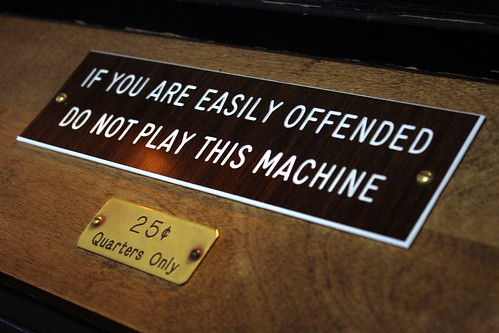I get the impression that we, as a society, have grown increasingly thin-skinned: Everybody seems so touchy these days, so sensitive to the smallest offense.
I wonder if maybe the problem is not so much that we’re offended (or offensive) as that we don’t really care about one another. We do more than just choose sides over divisive issues; we draw battle lines, dig trenches, and build fortifications around our positions so that it seems we “care” more about the issues than we do about our fellow human beings. Like troops steeling ourselves for battle, we cease for a time even to think of our opponents as human.
We are quick not only to take offense but to show it — to advertise the fact that we are offended. And there is no shortage of people ready to ally themselves with us against the offender, to try them in the court of public opinion and hang them in electronic effigy, as if a chorus of shrill, shouting voices is somehow more coherent and convincing than our single, small voice would be if we stepped toward the offender and offered, in private or to a very limited audience, an explanation of what grieved us.

Should every Internet-connected computer have a sign on it like this? (Image: “Easily Offended,” by Derek Bruff, on Flickr under Creative Commons.)
I admit: Sometimes I suffer from the affliction of not caring. Not caring about particular issues, but worse, not caring very much about the people who care about those issues.
I think that if I did (or do) care about you and have a connection with you, I should offer my grievance between the two of us — or in a small group if that would bolster my courage — rather than airing it to the world.* By broadcasting my offense, in effect I broadcast that I care little for you and do not wish to relate to you on a personal level.
That is, if I do or say something that offends you and you address the issue with me, what I do about it then will be related to how much I care about you: about your perceptions, about your feelings, about you as a person.
If I care about you a lot, I will find a way without compromising my principles to apologize, attempt to make amends, and try to modify my behavior so I don’t offend you in the future. If I care about you only a little, I might apologize — possibly insincerely, I admit** — but I’m unlikely to make amends or to change my behavior. If I don’t care about you at all, I won’t apologize nor will I see any need to make recompense or act any differently.
But how much I care may be affected by whether you have addressed the issue with me privately or castigated me in public. The way in which you approach me will demonstrate whether you care about me; is it any wonder that I might reflect that back at you? The worse I feel I’ve been treated, the less I am likely to care about those mistreating me and the higher and stronger I will build my side of the wall between us.
Or, to put it another way: If what I do or say offends you and I know it and continue to do it anyway with no attempt at bridging the gap between us, the message is that I care not a whit for you. I am secure behind my battlements, ready to toss insults and taunts and other, less savory things at those who assail me.
The reverse is also true: If what you do offends me and you persist in it knowing it offends me, then no matter how you dress it up in your “right” to do whatever, the message I receive is that you care nothing for me and others like me whom you offend.
That is our right, of course. We have no obligation to care for one another, but the world might be a better place if we did.
___
*In this regard, the way Jesus taught his disciples to deal with each other one-on-one first was one of the wisest pieces of advice he ever gave.
**A teacher of mine once said, “… I apologize, but this apology is in no way sincere.”








